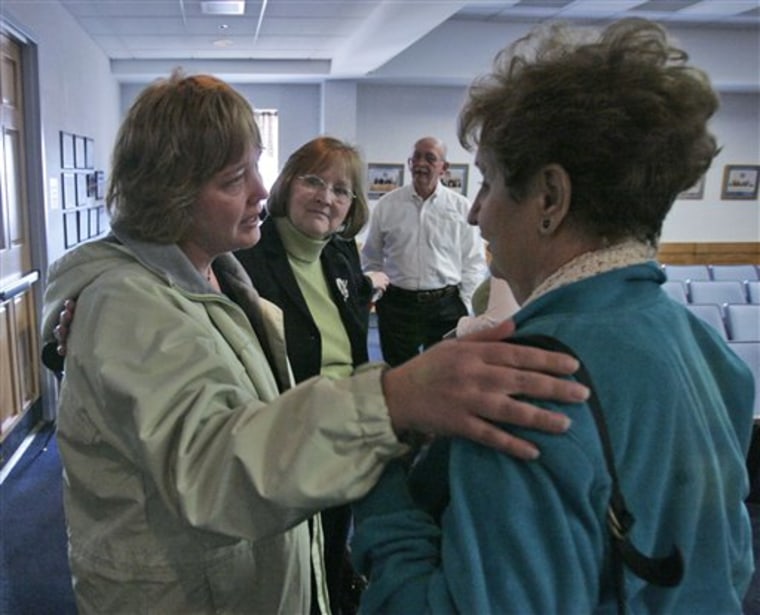A teenager working part-time at an ice cream parlor in 1967, Sharron Diane Crawford Smith shot two co-workers in the head after they mocked her for being lesbian, a terrible secret at the time.
Police learned her motive in a confession when she was terminally ill last November and made it public Friday, four days after she died.
Smith ensured the mystery would outlive her, however, when she also claimed the lead detective, now dead, helped her bury the murder weapon. Investigators swore Friday to verify that allegation and to find out why one of their own would have hidden Smith's guilt in a case that has practically become folklore in this Shenandoah Valley city of 25,000.
"If he had anything to do with covering this thing up," Commonwealth's Attorney Raymond C. Robertson said as residents lined the city council chambers to hear the news, "we are hell-bent on finding out what it was and why."
Smith, 61, died Monday, more than a month after her arrest in the deaths of 19-year-old Constance Smootz Hevener and her 20-year-old sister-in-law, Carolyn Hevener Perry on April 11, 1967. Smith told investigators she shot both women in the head in the back room of the ice-cream shop because they teased her about being homosexual, Robertson and Staunton Police Chief Jim Williams said.
"That was different in 1967 than it is today, extremely different," Robertson said. "It would have been a matter that it would have had different ramifications that it would today if it had been made public."
Police cover-up?
Smith told police she gave the .25 caliber pistol she used to shoot the women to detective David Bocock, and they buried it.
Bocock died in 2006, leaving a wife who is now in a nursing home. Police are investigating his involvement, although they said other aspects of Smith's confession have checked out.
"We know that's what she told us and we're trying to corroborate every aspect of her confession," Robertson said.
Robertson did not know the extent of the relationship between Smith and Bocock, though he said she had practiced shooting at Bocock's farm.
Smith swiped $138 from the store as she fled, which led police to think it was a robbery. Police initially focused on William Thomas, who told them he saw two men running from the scene. Thomas was tried for one of the murders and acquitted, but the other murder indictment remained on his record until Dec. 30, when Robertson said police were satisfied that he had nothing to do with the murders.
Thomas said having that hanging over his head for 40 years was tough, though it could have been worse.
"My loss is not comparable to what happened to those families," Thomas said recently. "Regardless of whether those girls — there may been some things they were doing that may or may not have been correct — but certainly they didn't do anything to deserve what happened to them, and those families didn't do anything to deserve what Dave Bocock put them through."
Smith moved away for a long time after the killings, got married and had two daughters, both of whom have declined to speak with The Associated Press.
About two decades after the killings, Smith returned to Staunton without her husband and moved in with a woman, living with her new partner until her death. Her partner also has turned down interview requests.
'She was the one'
The investigation meandered until last summer, when police heard from Joyce Bradshaw, who worked with Smith at her other job. Bradshaw said she went out to grab a burger with Smith about a week before the shootings and that Smith showed her a gun and told her she had two bullets — one for her stepfather, who had sexually abused her, and one for "that Hevener girl."
After the shootings, Bradshaw said, she told Bocock about Smith's statements. The detective came back to her a couple of days later and told her that Smith had taken a polygraph test and passed it, and that the bullets didn't match Smith's gun.
Bradshaw said Bocock also mentioned that Smith was a good shot, something she took as enough of a threat that she was afraid to go back to police after that.
"I tried 41 years ago, but it just didn't work out," Bradshaw told the AP last week. "But I always knew that she was the one."
Williams said police had not focused on Smith until recently because their records indicated she had been cleared.
Danny Perry, Carolyn Perry's widower, said he was glad that now they at least know who the killer was, even if it may never really be known if others were involved.
"We'll just have to wait and see down the road the real why and if there was a cover up," Perry said.
Robertson said he worked with Bocock for more than a decade and that he always knew him to be a "genuinely good, responsible and competent police detective."
Authorities promised to continue to seek the truth.
"While we are continuing to investigate this matter," Williams said, "the fact remains that there will likely be questions surrounding this case we will never be able to answer."
